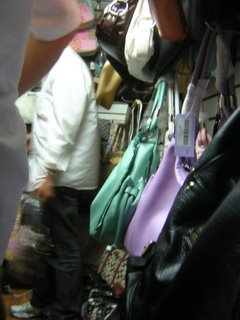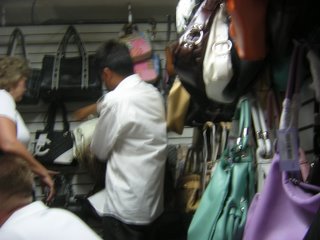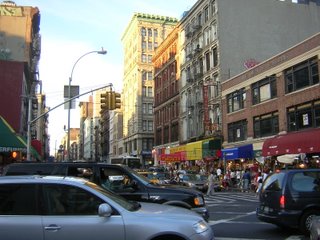 Fear and greed are two of the most basic of human instincts. All markets operate on the dynamic between these two primal urges…whether they’re trading futures on an electronic exchange, or selling wares on the side streets of lower Manhattan.
Fear and greed are two of the most basic of human instincts. All markets operate on the dynamic between these two primal urges…whether they’re trading futures on an electronic exchange, or selling wares on the side streets of lower Manhattan.One of our excursions this week took us into Chinatown on Manhattan’s lower east side. Just getting there was an adventure, and a real culture-shock from New York City’s nearby Financial District. There were several challenges, among them negotiating the Metro Subway system with closed stations. Another challenge was dealing with language barriers, although I suspect some of the people we dealt with utilized selective comprehension of some of the things we asked.
 In a classic scene right out of the Prohibition-era, we entered a shop on Canal Street, and when we asked whether there were specific items we sought, we were told “my brudda’s store” had what we were seeking. This initiated a clandestine trip around the corner, down a side street, and into a shabby inner-sanctum, complete with lookouts on Nextel two-way phones, a series of locked doors and a flight of stairs below street-level.
In a classic scene right out of the Prohibition-era, we entered a shop on Canal Street, and when we asked whether there were specific items we sought, we were told “my brudda’s store” had what we were seeking. This initiated a clandestine trip around the corner, down a side street, and into a shabby inner-sanctum, complete with lookouts on Nextel two-way phones, a series of locked doors and a flight of stairs below street-level.This was no speak-easy, but a stealth shop stocked with knock offs of famous name brand items of questionable quality and free market prices. The room was barely the size of a moderate bedroom closet, and close-quarters for the shop keeper and three patrons.
 The bargaining commenced when the door was latched behind us, sealing us into this subterranean bazaar driven by greed on both sides of the exchange (“I sell to you for more than you think you want to pay” vs “I buy from you for less than you want to take”) and not a little fear.
The bargaining commenced when the door was latched behind us, sealing us into this subterranean bazaar driven by greed on both sides of the exchange (“I sell to you for more than you think you want to pay” vs “I buy from you for less than you want to take”) and not a little fear.If NYPD officers were to discover the location of this shop, where only cash was accepted, and no receipts given, it would be out of business within the hour.
We had passed a few tables of merchandise on Canal Street that attracted our interest, but were told the proprietor had been taken way by NYPD officers earlier for selling items he ought not. So our visit to into the Twilight Zone of Chinatown’s black market provided more of a cheap thrill to out-of-towners than it produced any commerce of consequence.
I really freaked out the shop keeper when I gently asked his name. Just a Texan in New York, trying to be neighborly. He wasn’t telling, and became quite furtive in his behavior at that point. We were whisked up the narrow flight of stairs, and watched as he slid open the bolt in the door, and peeked out onto the sidewalk in both directions before fully opening the door to allow us to leave. He suddenly developed English-amnesia and became incapable of understanding anything I said at that point.
 We thanked him for his time as he melted into the crowd, but not before he and his “sister-in-law” became engaged in a staccato discussion (in their language) about what could only have been her indiscretion in sending us to his “store.”
We thanked him for his time as he melted into the crowd, but not before he and his “sister-in-law” became engaged in a staccato discussion (in their language) about what could only have been her indiscretion in sending us to his “store.”Fear and greed are powerful components in many transactions…but so is the ability to discern value. The only thing gained in this encounter was a little grist for this blog and two surreptitious images from a tiny camera in my pocket.
At the end of the day, value beat greed, and fear melted the moment in the quest for a bargain and the promise of a sale. At the end of the day, cash was king, and we retained title to the throne.
Such is life in the marketplace, whether at Broad and Wall, or Canal and Lispenard Streets.
1 comment:
A Tenant’s Guide to Renting
The first challenge every tenant faces is finding an apartment for rent that suits their individual needs. For today’s tenant, the most effective apartment search can be done using an online apartment finder. Tenants should decide what they require in an apartment or house rental before beginning their search. For example: the number of bedrooms, location or distance from public transportation and how much the tenant can afford to pay in rent, furnished or unfurnished apartment, etc. By making these important decisions first, tenants can avoid renting an apartment or house only to regret it later. Many tenants today are taking advantage of the convenience of the internet to locate apartments for rent as opposed to the traditional print publications.
Once a possible apartment or home has been found, it is the tenant's duty to thoroughly inspect the premises making a commitment in the form of a security deposit. A tenant should not rely on the landlord or the landlord's agent to tell the tenant if anything is wrong with the property. The tenant must inspect the property carefully and ask questions about it.
Inspecting the condition and functionality of the following areas/features of the apartment before committing yourself as a tenant is highly recommended.
1. Kitchen appliances in working order.
2. Water pressure strong, plumbing without leaks.
3. Electrical outlets and wiring working.
4. Walls and ceiling painted or papered without cracks
5. Ventilation or air conditioning accessible.
6. Floors, railings and bathrooms in good repair.
7. Fire escape easy to use.
8. Stairs safe and well-lighted.
9. No rodents or insects.
10. Heating system in working order.
11. If furnished, check and write down condition of all furniture.
12. Windows and doors operable and weather-tight; screens provided.
The tenant should also check the security of the building to find out if there is a dead-bolt lock, security chain, or through-the-door viewer.
BEWARE OF EXISTING DAMAGES: In order to avoid being blamed for damages that already exist in the rental unit, the cautious tenant should take every step for self-protection. Before moving in (or as soon as possible thereafter), the tenant should make a list of all existing damages and repairs that need to be made. A copy of the list should he presented to the landlord and attached to the lease This way the landlord cannot blame the tenant for damages caused by others and the tenant will know what the landlord intends to repair. If the tenant keeps good records the landlord will not be able to keep the tenant’s security deposit for damages that were actually caused by others. Taking pictures before moving in is also strongly recommended.
ABOUT THE AUTHOR: Paul Rossano, associated with www.AllSpaces.com who “Conveniently Connects All People with All Spaces in All Places” has been dedicated to the Real Estate rental market for over 8 years. He has assisted over 25,000 tenants with their renting needs. Any questions about renting apartments, houses or other rentals, feel free to visit www.AllSpaces.com or email him at Paul@AllSpaces.com.
Post a Comment